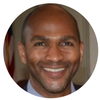White Rhino healthcare guest INTERVIEW
I recently sat down with Anaye Milligan, former Digital Marketer Director at Insperity and The New York Times Company, for a fresh perspective on some of the challenges facing today's marketers in healthcare.
|
|
Interview with Anaye MilliganDirector Digital Marketing
|
QUESTION: What trends from your work in other industries are now taking shape in healthcare?
ANSWER:
We are in an age where consumers can make their own decisions and are no longer at the mercy of sales people. They can go to a store to be informed by a sales person, but they also have the opportunity to go online and do their own research. We've seen that completely up-end how cars, consumer electronics and other products are sold. And similarly, people expect the same sort of options within healthcare.
Today’s health consumer wants to know about a condition and options for treatment and procedures before they take their doctor's recommendation. They want to look at reviews and know something about the doctors they have to choose from before they select one. This means the patient journey is evolving.
The opportunity to develop a message and campaign that addresses the needs of consumers throughout every step of that journey is a huge opportunity.
QUESTION: What are the challenges of evolving healthcare marketing to address this new patient journey?
ANSWER:
One of the big challenges is figuring out what the right mix is for the different parts of the journey. Not only do you have to get the message right at each stage, but you have to know what is the right tactic and what is the right channel or medium that you need to leverage to get the best results.
Today you have to live and die by numbers and do closed-loop reporting in order for you to be a smart marketer. Ten years ago, when I was working in the newspaper industry, we knew what our cost per acquisition was overall and by channel. We could invest X amount of money in our direct mail, our robo-calls, our events, and we could maximize spending up to the saturation point of the lowest cost channel and then moving up the line. And then if we wanted to grow subscriptions or readership by X percent, we do the math and figure out how much we would need to invest in different areas.
But in healthcare, I've found myself having conversations that I never had to have when I was in the B2C space. In healthcare, you point to your results and someone says, "Eh, I think X campaign was better" or "I'd rather do A, B, or C". And, you say, "Well, that didn't lead to as many conversions". And they say, "Well, we don't track conversions that way, we track conversions this way" or "Yeah but I don't know that those are the right kinds of conversations." And, you get into this very subjective dialogue—as opposed to being able to have definitive answers to things just based on math and metrics that really tie back to revenue.
We have limited information and that compromises our ability to make smart choices. In healthcare, everybody recognizes that digital is the path forward. Everybody knows that digital is where we need to invest. But, actually showing the ROI there and figuring out how you justify the investment, both in technology and in people is difficult.
QUESTION: So what is the path forward? How do we get closed-loop reporting in healthcare?
ANSWER:
The big opportunity right now is CRM.
The numbers that you can track in your conversion funnel eventually stop returning information back to you if you can't track them all the way into becoming a patient and what happens next.
Right now my situation is that we can track if someone schedules an appointment or signs up to request an appointment—but whether or not they actually showed up at the doctor's office, what their insurance status is, whether they’re Medicaid, Medicare, noninsured, self-pay or commercially insured, etc. isn’t there.
This insight becomes very important when you consider that we only make money on one of those categories and we don't know whether or not it led to a hospital encounter down the road.
We need CRM to get there.
QUESTION: But how do we get there? CRM seems like a complicated investment where you need to involved multiple departments in the organization.
ANSWER:
When we say CRM it's actually not the same thing we mean in most industries. Healthcare CRM is really more akin to a database-marketing platform with a reporting capability. Because there is no Salesforce for it to manage and your call center may or may not use it. Your guest relations team probably won't use it. Your doctors don't use it either.
So it's much more limited in scope and therefore an attainable reality compared to CRM solutions in non-healthcare organizations.




